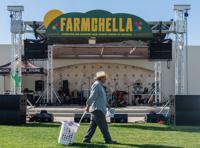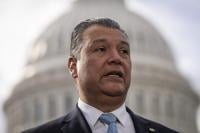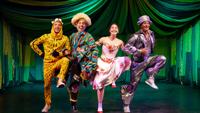
In the 2023-2024 school year, the book ban crisis affected 4,231 unique titles, as stated by PEN America research. Photo by Becca Tapert
Now that the Department of Education under President Donald Trump’s administration has dismissed book ban complaints as a hoax, a Latino student-led group from California State University, Long Beach and a nonprofit organization have launched a campaign to support local public libraries.
They aim to raise awareness about the dangers of book and literacy censorship and the vital role libraries play, especially among Latino and immigrant communities.
Libros Unidos LB, in collaboration with EveryLibrary, looks to encourage Long Beach residents to recognize the importance of access to books and the crucial role libraries have in supporting education and community, as well as making sure that knowledge is accessible to all people, regardless of background or political beliefs.
Sara “SJ” Cárdenas, team leader of Libros Unidos LB, said book banning tends to disproportionately and severely impact diverse voices by limiting access to literature that reflects the unique experiences of marginalized communities.
“When you ban books, you're eliminating stories and characters, and many of those characters within these banned books represent people within the vulnerable communities,” she told CALÒ News.
Connecting the Latino community in Long Beach and surrounding cities with library resources that can greatly enhance their lives, such as ESL classes and programs, career development, free printing services and internet access, is one of the campaign's main goals.
As part of their campaign, both organizations are hosting several events, including a table talk on censorship, a banned book drive and a Lotería game night, among other events.
“Since all of us are Hispanic or Latina, we really felt moved and inspired by EveryLibrary’s efforts,” Cárdenas said. “We refuse to stand by and allow our ancestors’ voices [to] be silenced and their stories erased. This campaign is not only for Latino immigrants but for all the other oppressed communities and individuals whose intellectual freedom is at risk.”
Since its founding in 2012, EveryLibrary has worked to support local public libraries and school library alliances across the country that are working to ensure that books remain on shelves, librarians’ jobs are preserved and libraries are free from political interference.
In the 2023-2024 school year, the book ban crisis affected 4,231 unique titles, censoring the works of 2,662 authors, 195 illustrators and 31 translators, a sum of 2,877 creatives, as stated by PEN America research.
Last month, on January 24, just four days after President Trump's inauguration, the United States Education Department called book banning a “hoax” and announced it would be dismissing 11 complaints received during the previous administration relating to book bans by local school districts.
According to research by PEN America, one of the leading nonprofit organizations advocating for free expression and human rights, more than 10,000 books were banned in public schools from 2023 to 2024, tripling nationwide from the previous year (3,362).
According to the research published last November, PEN America analyzed the content of the most commonly banned books this year and found that these books overwhelmingly include books with people and characters of color (44%) and books with LGBTQ+ people and characters (39%).
PEN America also concluded that nearly 60% of these banned titles are written for young adult audiences and depict topics young people confront in the real world, including grief, death, experiences with substance abuse, depression and mental health concerns and sexual violence.
Some of the authors and books who have been banned throughout the years include “The Bluest Eye” by Toni Morrison, “The Color Purple” by Alice Walker, “The Kite Runner” by Khaled Hosseini, “Looking for Alaska” by John Green, “The Perks of Being a Wallflower” by Stephen Chbosky and “The Absolutely True Diary of a Part-Time Indian” by Sherman Alexie, among others.
The American Library Association has also stated that not all attempts to ban books are documented or formally filled. The association referred to something called soft censorship, where books are purchased but placed in restricted areas in school libraries or other places. Oftentimes, these books are not used in library displays and are otherwise hidden or kept off-limits. “In some circumstances, books have been preemptively excluded from library collections, taken off the shelves before they are banned, or not purchased for library collections in the first place,” the association stated.
According to Cardenas, the campaign is made possible through the 2025 Bateman Case Studies Competition hosted by the Public Relations Student Society of America (PRSSA), which is designed to give public relations students across the nation, like those who make up Libros Unidos LB, an opportunity to apply their educational experiences to create and implement a full public relations campaign for a non-profit organization like EveryLibrary.
Cardenas said amplifying EveryLibrary’s work and being part of a national organization combating censorship and book banning has been a way to also preserve the communities and identities that hold and make up the U.S.
“This fight is bigger than just books—it’s about who gets to tell their story and get their voice heard,” said Cárdenas. “Libros Unidos LB isn’t going to sit around and let censorship erase our voices or our history. We call on our community to join this fight with us.”











(0) comments
Welcome to the discussion.
Log In
Keep it Clean. Please avoid obscene, vulgar, lewd, racist or sexually-oriented language.
PLEASE TURN OFF YOUR CAPS LOCK.
Don't Threaten. Threats of harming another person will not be tolerated.
Be Truthful. Don't knowingly lie about anyone or anything.
Be Nice. No racism, sexism or any sort of -ism that is degrading to another person.
Be Proactive. Use the 'Report' link on each comment to let us know of abusive posts.
Share with Us. We'd love to hear eyewitness accounts, the history behind an article.